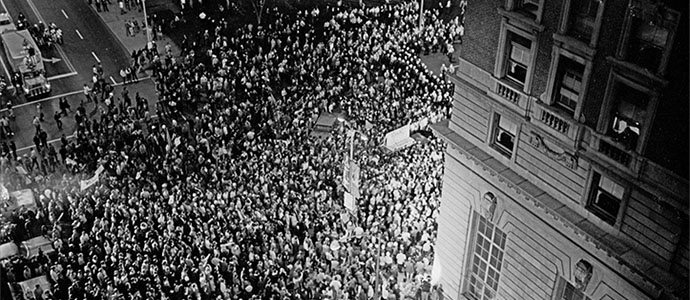
Max Boykoff has a new article published in the March 2014 edition of Nature Climate Change:
Boykoff, M. T. (2014). Media discourse on the climate slowdown. Nature Climate Change, Volume 4, pp. 156-158, Published March.
Media discourse on the climate slowdown
We must not fall victim to decontextualized and a historical media accounting of climate trends.
Excerpt: In August 1968, protestors from the Students for a Democratic Society — an activist movement in the United States — repeatedly hurled the phrase ‘the whole world is watching’ outside the hotel in Chicago where the Democratic National Convention was being held. As Columbia University professor Todd Gitlin later documented in a book1 titled by the same phrase, media coverage of the clashes accompanying the refrain then served to draw wider visibility to their antiwar activities and claims. He found that implications from the media representations were twofold: first, coverage largely framed the protests as a fringe action promoted by marginalized actors; however, second, the increased media coverage of the Students for a Democratic Society actions actually boosted awareness and bolstered member enrolments in the student-led movement.
These insights from Gitlin, along with those of other scholars across a range of perspectives, help inform considerations of the interactions between climate science, policy, media and the public today. Specifically, these findings guide our thinking about the swirling media discourses of a global warming pause, or hiatus or slowdown, that gained momentum, especially in this past year.
Discourses are essentially sets of categories, ideas and concepts that give meaning to phenomena. Maarten Hajer has pointed out that they can “frame certain problems … [and can] dominate the way a society conceptualizes the world”2. Through media representations, framing processes have had important effects on marginalizing some discourses while contributing to the amplification of others. Among early media discourses that sought to explain this climate phenomenon, environmental scientist Bob Carter penned an op-ed in The Telegraph of London in 2006 called ‘There IS a problem with global warming… it stopped in 1998’3 where he pointed to University of East Anglia Climatic Research Unit records of stalled global surface temperatures. Blog posts and media stories in the years that followed (for example, Real Climate, Watts Up With That, Tom Nelson, Andrew Revkin at DotEarth and the New York Times) logically sought to better understand this trend. Read more …

